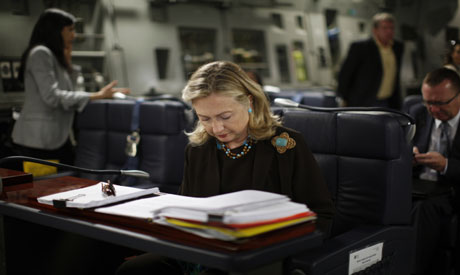
U.S. Secretary of State Hillary Rodham Clinton works from a desk inside a C-17 military plane upon her departure from Malta, in the Mediterranean Sea, bound for Tripoli, Libya, Tuesday Oct.18, 2011.(Photo:AP)
US Secretary of State Hillary Clinton was due in Pakistan on Thursday, joining American national security leaders at crunch talks designed to build pressure on Islamabad to attack militant havens.
Fresh from meetings in Kabul, she was to be joined in Islamabad by CIA chief David Petraeus and the top US military officer, Martin Dempsey. They will meet top civilian and military leaders in the capital.
Pakistan has long seen US leaders as divided between "good cop and bad cop", but the Clinton-Petraeus-Dempsey troika is a rare joint showing designed to present a united American front in its dealings with Pakistan.
It has also been interpreted as a sign that Washington is closing ranks and ramping up the pressure on Pakistan, where the United States is deeply unpopular.
After a bombing on a US base in Afghanistan and a 19-hour siege of the US embassy in Kabul last month, Washington dramatically escalated pressure on Pakistan to crackdown on those it says were responsible -- the Haqqani network.
Al-Qaeda-linked and loyal to Taliban leader Mullah Omar, Haqqani leaders have long maintained a base in Pakistan's North Waziristan district, where Pakistan has refused to launch an offensive demanded by the Americans.
Across the border in Afghanistan, US and Afghan forces are now waging a new push against the Haqqanis, although Pakistan has reportedly warned that US troops would suffer "10 times" greater losses if they cross the border.
Dempsey's predecessor Admiral Mike Mullen called the Haqqani network the "veritable arm" of Pakistan's Inter-Services Intelligence and accused Pakistani spies of being involved in the embassy siege.
Although Pakistan denies supporting the Haqqanis, security officials say privately that contacts are maintained to facilitate any eventual settlement in Afghanistan.
Some analysts in Pakistan have chosen to see the visit as a fence-mending exercise designed to smooth over the ruptures caused by Mullen's remarks and the unilateral American raid that killed Osama bin Laden in May.
US media outlets have presented the talks as an opportunity for the United States to ratchet up pressure on Pakistan as Congress signals it could make billions of dollars of aid money dependent on greater cooperation.
With the war in Afghanistan into a 10th year and the Obama administration bound into a 2014 deadline to withdraw combat troops, Washington is stepping up the search for a political settlement, in which it sees Pakistan as integral.
"There exists a serious trust deficit between the two countries and we hope that all issues of concern will be thoroughly discussed," a Pakistani security official told AFP.
Pakistan argues that it has already made tremendous sacrifices, losing 3,000 soldiers and thousands of civilians in bomb attacks on its soil, and that it cannot do what the Americans demand when the relationship is so unpopular.
"When the Americans ask us to do more, why don't they try to understand our problems and address our reservations and concerns?" said the official, calling for an understanding "written out in black and white" to avoid future problems.
"Pakistan will tell the Americans that the military options are getting limited in Afghanistan and there is a need to promote a genuine Afghan-led peace process through dialogue involving all the stakeholders," he added.
Short link: